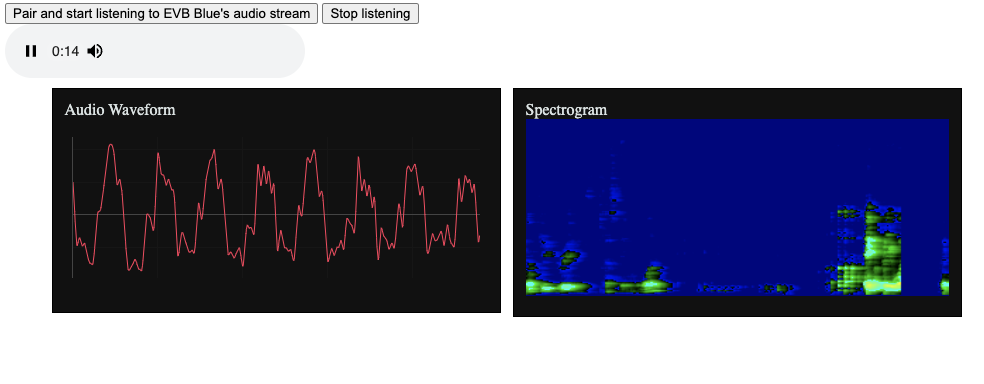Speech-Enhancing Bluetooth Microphone Demo
This example shows how to use Ambiq's NNSE to create a 'Speech Enhancing USB Microphone'. NNSE is Ambiq's AI speech de-noiser, a real-time AI model that removes background noise (such as the noise from a hair-dryer) from human speech.
sequenceDiagram
participant Microphone-on-EVB
participant NNSE
participant Opus-Codec
participant WebUSB
participant Chrome-on-PC
Microphone-on-EVB->>+NNSE: 10ms Raw Audio
NNSE->>+Opus-Codec: 10ms Clean Audio
Microphone-on-EVB->>+NNSE: 10ms Raw Audio
NNSE->>+Opus-Codec: 10ms Clean Audio
Opus-Codec->>+BLE: 80 byte 20ms Opus Audio
WebUSB->>+Chrome-on-PC: 80 byte Opus AudioHardware Requirements
- Apollo4 Plus or Apollo510 EVB
- VOSKit PDM or analog microphone (AP4 only)
- PC or laptop running Chrome
This demo supports both PDM and AUDADC microphones, but is configured for PDM by default. To switch to AUDADC, uncomment this line in nnse_usb/src/nnse_usb.cc:
// #define USE_AUDADC // Uncomment this to use the AUDADC instead of the PDM
Running the demo
First, flash
$> make clean
$> make -j
$> make EXAMPLE=demos/nnse_usb deploy
With the firmware deploy, follow this link on a PC using the Chrome browser: Audio WebBLE Demo
The webpage should look something like this:
Click on the 'Pair and start listening...' button to bring up a list of compatible WebUSB devices. Once paired, the web dashboard will play the audio (click the play button to allow the browser to actually play the stream) and show corresponding waveforms and spectrograms.
Once everything is working and audio is streaming, you can turn de-noising on and off by pressing Button0 on the EVB.
Recommendations
The EVB's microphone will pick up the audio being played by the PC, often leading to a feedback loop. We recommend using headphones connected to the laptop to prevent this feedback.
For a more effective demonstration, use noise-cancelling headphones and introduce noise to the environment such as a hair dryer, traffic noise, or similar. The noise cancelling headphones should remove most of this ambient noise. When the EVB is in raw audio mode (as mentioned above, you can switch between modes using Button0 on the EVB), the EVB microphone's audio will be passed to the headphones, and the user will hear the ambient noise. When the EVB is in speech de-noising mode, the ambient noise will be removed but any speech will be cleaned up and passed through to the user's headphones.
